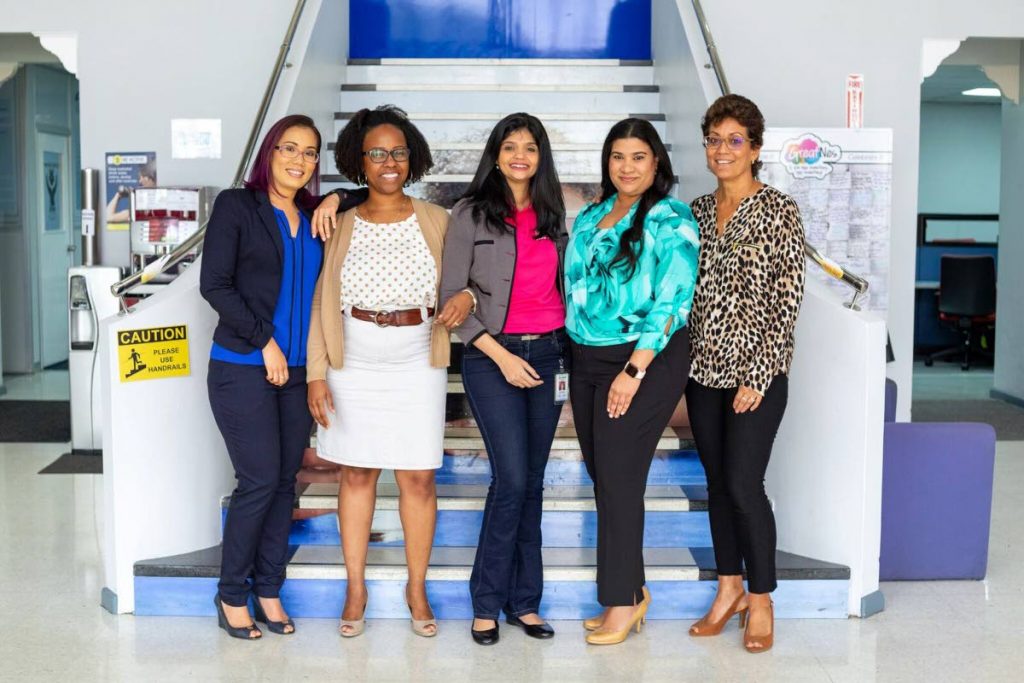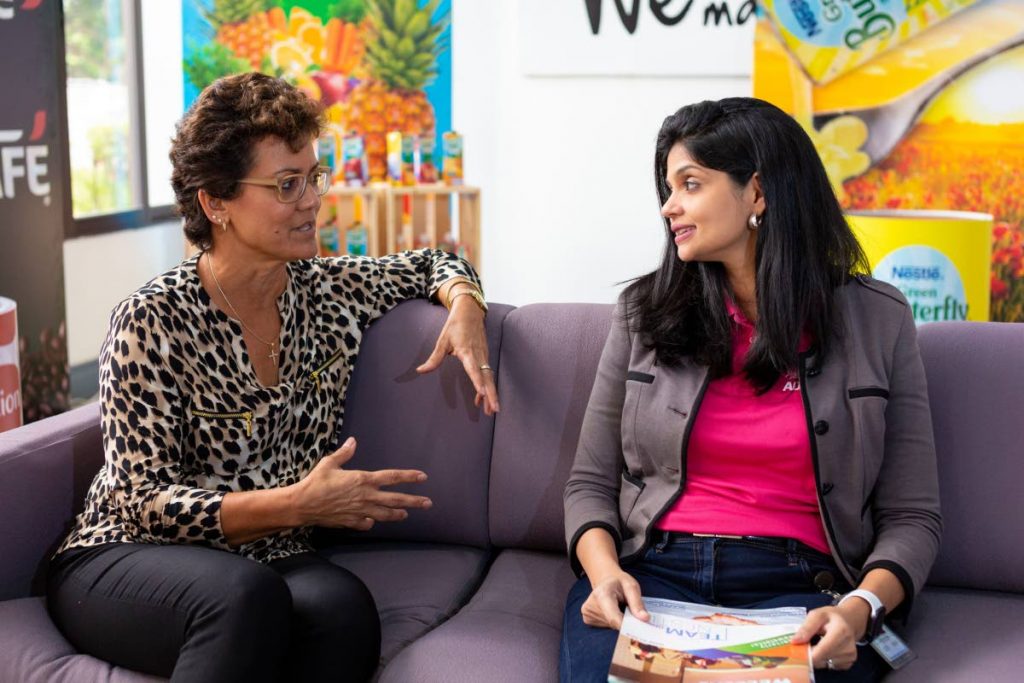Diversity in workplace

For female millennials entering an organisation, at any level, gender balance is something they expect.
“That’s not something they would want advice on because to them this is how an organisation should be,” notes Nestle’s head of corporate communications for the Anglo Dutch Caribbean region, Denise D’Abadie. “It’s a given. The way things are supposed to be. Whereas for me, I’ve seen the evolution.”
D’Abadie started working at Nestle over three decades ago, in the days when it was a male-dominated environment and “there was no question as to what time you had to get to the office and no question as to what time you had to leave.”
Earlier this month, the company made a commitment, through its gender balance acceleration plan, to appoint women to 200 senior executive positions across the globe, increasing female leadership from 20 to 30 per cent by 2022. Additionally, in the company’s gender parity initiative, female employees at Nestle have access to flexible working hours, an opportunity to work remotely, a lactation room for breastfeeding mothers, the option of extended maternity leave – three additional months with no pay – and special parking spaces for pregnant mothers, as close as possible to their specific offices, all in keeping with global best practice.
The company also offers mentorship programmes that allow young employees access to leaders across Nestle’s global operations early on in their career.
“It is simply the right thing to do. We believe that a more diverse workforce with more women at the top will reinforce our inclusive culture and make Nestle an even better company. We are setting measurable targets to hold ourselves accountable. We know that improving gender balance will lead to better decisions, stronger innovation and higher employee satisfaction,” Mark Schneider, Nestle CEO said in a release.
“This is amazing! It is something that you’re proud to see. The progression of an organisation in such a forward and positive manner,” D’Abadie said. “When I joined there were no women on the management committee. I started a year after I got married, and I started having kids. At that time we had three months' maternity leave.

"At that stage too I felt pretty much that my career had stopped because I was having children.
"But I was treated with respect, and to be honest, I have seen a big change across those years…Now about 50 per cent of our team is female. For me it’s like seeing the evolution of an organisation in such a positive manner you can only feel proud. I’m a little jealous, but I’m proud that they (other women) can be afforded these opportunities.”
D’Abadie said these commitments are not just for executives, but apply across the board for Nestle employees.
“The opportunity to work remotely is for all employees. Of course it depends on your particular role. Some roles will demand that you have to be in the office; others, you have the opportunity to work remotely, and that is a decision that you take with your line manager. The others – the extended maternity leave, access to the lactation room – that is for everyone, not just for the executives.”
Flexibility on paternity leave
Men are entitled to five days' paternity leave, but head of human resources for the Anglo Dutch Caribbean region Kristin Martinez said if a new father wants to extend his leave without pay, it can be considered. “We are promoting flexibility across the board because we are looking at gender balance in the workforce.”
Martinez, a new mother, told Business Day over the last five years the company has been rolling out its promotion of gender balance, something for which she is grateful, especially when she had to return to work at the end of her maternity leave. “We are very passionate about promoting a workforce where people have equal opportunities…The organisation is not seeing a mother or female executive as someone that is limited because they now have a family and their personal life has changed.”
The company, she said, also looks at it from a business angle.
“For those of you that don’t know, 80 per cent of the people who make purchasing decisions of Nestle products are females, so it also makes business sense for us to ensure we have a pipeline of female leadership in our organisation.”
She said the initiative is built on three pillars.
“Bold leadership is geared at ensuring that our senior executives drive gender balance throughout the organisation; empowering culture focuses on educating our employees about those unconscious biases that we all have; enabling practices is where we put together flexibility to create those work-life balance to encourage female leadership in the workplace.”
Business executive officer for the Anglo Dutch Caribbean and mother of two, Elisa Doldron has worked at Nestle for over 12 years. She said throughout her career at the company the combination of having “good” leaders, her attitude towards her work and the deliverables have afforded her many opportunities.
“I never really felt like I had to push (for gender balance), rather, having a really good attitude and delivering really good results combined have given me a lot of opportunities.”
Not for parents only
But the benefits of the company’s gender balance push does not only extend to parents. Kavita Maharaj, Nestle’s business excellence manager for the Anglo Dutch Caribbean region has been with the company for 15 years and has held positions across functions.
“I started at entry level and over the years I’ve had many opportunities to work at Nestle offices in the region and internationally.” She has no children yet, but said she is happy to know that when she becomes a mother she’ll have access to the commitments.
“I’ve taken advantage of the mentorship programmes and the flexibility…And not just because you’re female you get these opportunities. The right candidate for the job will always get the job, or should get the job,” she told Business Day. She said a major part of succeeding in any job is not being afraid to ask for feedback.
Employee relations and talent manager Siti Jones also appreciates the gender balance stance her employer has taken.
“I don’t have children, but the example I’ve seen set speaks volumes about how the organisation views mothers. That attitude speaks more to me than even facilities: the example of mothers in the organisation who are leaders and how they manage it with maturity. The fact that they can do it speaks to the organisation’s culture.”
Jones has been with Nestle for four years and said her experience is that the respect the company has for women is “tangible.”
“We hear about it (gender balance) on International Women’s Day. but not throughout the year. Here it is real. I’ve been given many opportunities…The opportunities are real and are linked to your ability to deliver results.
"So it’s more than just being a woman. My experience here has been quite outstanding and I really grateful for the opportunities because I know it is not that easy in other industries and other companies.”
She advises young women entering the workplace to take advantage of opportunities, even though they may appear challenging.
Among Nestle’s other planned initiatives in promoting gender balance in the workplace is the creating a space for the children of employees.
“Part of our plan is to implement a homework station, where we will have a dedicated room where parents can leave their children supervised by trained professional and caretakers. And then our intention will be to move toward a full daycare service,” Martinez said.


Comments
"Diversity in workplace"